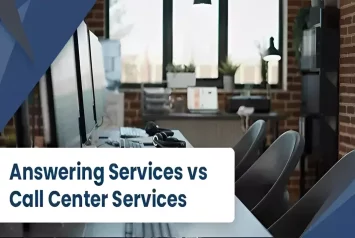Different Types of call centers you should know about
Do you know that a call center also has types? Maybe you never thought about it. Since to this point, you picture it as an organized place full of people busy making random marketing calls to people around the globe. That’s right, call centers do that, but it’s just one of the many things they normally deal with. Yes, there are different types of call centers, and this blog post aims to make you understand each one of them. So, ensure you stay with us till the end to make the most out of it.
Different types of call centers
Not one or two, but there are six different types of call centers, each one of which has its own purpose.
Inbound call centers
These call centers take care of the customers’ calls for an organization. Why are customers calling? Usually, to request support after the purchase. You are allowed to think that why isn’t the company taking care of these customer calls itself? Since an employee has a better knowledge of the product, he could do it better. Therefore, what’s the point of outsourcing this responsibility to an inbound call center?
A company outsources because it lacks the skills and expertise to handle inbound calls professionally. Secondly, dealing with a call or two is not an issue, but a large organization receives thousands of calls daily, so they need to manage them properly. Yes, maintaining a dedicated inbound calls department is an option, but that could be costly compared to call center outsourcing. Hence, hiring a call center services provider is sometimes the company’s most feasible option.
Let’s now discuss what an inbound call center primarily looks into.
Technical Support: A customer may call the company to request a bit of technical advice on the product they have recently bought. It may range from a simple inquiry about a password change to personal account updating and more.
Order processing: Since online shopping is the new trend, most people prefer to purchase over the phone. The agent receiving such a call is requested to provide more information about the purchase. Plus he is also expected to record information and obtain payment details.
Appointment scheduling: Customers also call to request an appointment with the CSR. Usually, to discuss an issue or to acquire some information. The agent knows that it can greatly influence customer’s loyalty and satisfaction. Hence, he keeps it simple and smooth.
Inquiries: An inbound call center services provider also receives inquiry calls from potential customers. Such calls are also a brilliant opportunity for an agent to enhance the customer’s interest in the company’s new products.
Complaints: Keeping your customer satisfied is the most important factor that builds a brand reputation. Hence if a customer has a complaint about your product after purchase, he’ll call the support department. A representative in that department must look into this matter very closely and try to resolve it. Accepting return is the last option, but businesses should also look to accept that for customer satisfaction. Hence, a company needs trained professionals to deal with customer complaints. So, they go looking for the best call centers.
Outbound call centers
In simple words, an outbound call center services provider reaches out to potential customers over a phone for sales or for conveying information. The purpose is to make them buy or to let them know about a product or service. An agent in the outbound call center is most commonly required to deal with the following.
– Lead Generation
– Telemarketing
– Sales Calls
– Fundraising Calls
Can you think of a phone call greeting you warmly and then telling you about a product or service? That was the outbound call. Most probably from an agent working with an outbound call center services provider.
Contact Center Solutions vs Multichannel Call Center Services
A traditional call center services provider uses a phone to hear out a customer or to reach out to a potential customer. Whereas, a contact center has more options for communications, such as emails, faxes, and more. Thanks to the advancement of technology.
The contact center’s agents can thus engage people on their favorite platforms. Such as social media or sometimes an email works better than a phone call. Hence, contact centers are more effective than call centers.
Omnichannel call centers
Like the contact center services provider, these call centers also use multichannel to deal with both the inbound and outbound responsibilities. But omnichannel call center services providers let customers or prospects seamlessly switch between different communication channels. To achieve that, they use cloud-based contact center software.
Automated Call Centers
This call center uses a computer-based system to handle various calling responsibilities. Compared to live-operator call centers, automated call centers have a few people to handle tasks that automation cannot. An automated call center deals with the following:
– Automated voice mail management
– Assisting customers in finding a location of a nearby store
– Understanding caller words and navigating them through a menu or connecting them with a representative available
Virtual Call Centers
These days, most call center services providers are operating virtually. The staff of such call centers is not required to gather and work on-premises. Instead, they can work from anywhere worldwide. For as long as they can connect with the call center system using a laptop and internet connection. Most new businesses prefer such call centers for outbound and inbound responsibilities. Because they cost less.
Can one call center take on multiple responsibilities?
It depends on the structure of a call center and the number of trained employees they have. Large call centers mostly have dedicated teams to deal with inbound and outbound calls. Medium and small-sized call centers generally like to deal with either inbound or outbound responsibilities for large companies with thousands of customers. For smaller companies, however, they may choose to go with providing both the inbound and outbound calls services.
Conclusion
Call centers are more than places full of people engaged in telemarketing calls. There are various types of call centers, and each one deals with different calling responsibilities of an organization. This informative blog post was all about letting you understand the six types of call centers and how they are helping businesses.
We really hope you like the write-up. If you have any questions or something that we could add here, please comment or reach out via email.






